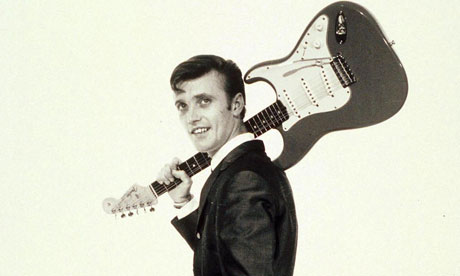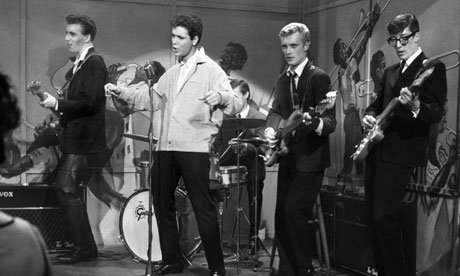The first and greatest bass guitarist of the Shadows, he also topped the charts with drummer Tony Meehan

Jet Harris in 1966.
With their line-up of three electric guitars and drums, the Shadows were the archetypal British pop group, supporting Cliff Richard and making numerous hits of their own. Their first and greatest bass guitarist was Jet Harris, who has died aged 71 of cancer. Although his later life was blighted by alcoholism and littered with unsuccessful comebacks, he deserves to be remembered as a pioneer of the electric bass in Britain who explored its melodic as well as its rhythmic potential. He was born Terence Harris into a working-class family in Kingsbury, north-west London. His prowess as a sprinter at Dudden Hill secondary modern school earned him the nickname Jet. Leaving school at 15, he went to work with his father as an apprentice welder making milk churns at the Dairy Supply Company in Park Royal. As a child he played the clarinet, but his interest in bass rhythms was piqued by hearing records by the pianist Winifred Atwell. This inspired him to make his own double bass. In 1958, Harris joined the backing group of the singer Larry Page before going on tour with Tony Crombie and the Rockets, one of the first British rock'n'roll instrumental groups. Crombie got a Framus bass guitar for Harris, making him one of the first British exponents of the instrument. He later favoured the Fender Precision bass. After playing with the Vipers skiffle group and the Most Brothers, he was invited to join Cliff Richard's backing group, then called the Drifters, whose lead and rhythm guitarists were Hank Marvin and Bruce Welch respectively. In 1959, the quartet made their first recordings as the Shadows, a name change suggested by Harris, because of the prior existence of the American vocal group the Drifters.  The 1961 film The Young Ones: left to right, Bruce Welch, Cliff Richard, Jet Harris and Hank Marvin.
The 1961 film The Young Ones: left to right, Bruce Welch, Cliff Richard, Jet Harris and Hank Marvin.
 The 1961 film The Young Ones: left to right, Bruce Welch, Cliff Richard, Jet Harris and Hank Marvin.
The 1961 film The Young Ones: left to right, Bruce Welch, Cliff Richard, Jet Harris and Hank Marvin. The Shadows' first and most memorable hit was Apache, which reached No 1 in 1960. Over the next two years, Harris played on more top 10 singles, including Man of Mystery, FBI and Kon-Tiki, before suddenly quitting the group in 1962. He later said that he had "just had enough of sleeping, drinking, eating and doing everything together, day in, day out". The most photogenic of the group, the moody-looking Harris was persuaded that he had a future as a solo star. He was immediately signed to a recording deal with Decca, releasing the top 30 hits Besame Mucho and The Theme from The Man With the Golden Arm, although the latter was banned by the BBC for the drug associations of Otto Preminger's 1955 film. With a backing group, the Jetblacks, he went on tour with Little Richard and the then unknown Liverpool group the Beatles. A triumphant 1962 ended with the award of the title top instrumentalist in the readers' poll of the New Musical Express. Harris next teamed up with the Shadows' former drummer Tony Meehan. As Jet Harris and Tony Meehan, they had big hits in 1963 with Diamonds – which reached No 1 – Scarlett O'Hara and Applejack. Among those Harris had inspired to take up the electric bass was the future Led Zeppelin member John Paul Jones, who was briefly a member of the Harris-Meehan touring band. By this time, Harris was also making news offstage. There were several court appearances involving drunkenness and violent behaviour before the partnership with Meehan came to an abrupt end in September 1963, when Harris was seriously injured in a car accident involving a vehicle in which he was travelling with the pop starlet Billie Davis. He later confessed that "The car crash shook me up horribly. I became a physical wreck and turned to the bottle … or rather two bottles of vodka a day." Six months later he attempted the first of several unsuccessful comebacks, failing to complete a brief appearance at the Edmonton Granada in north London. He subsequently took a variety of manual jobs ranging from bricklayer to hospital porter, getting back on stage occasionally during the summer season in Jersey in the early 1970s. The tabloid press periodically ran riches-to-rags-stories on Harris, at one point reporting him to be working as a bus conductor in Gloucestershire, and recording a live album in front of a captive audience in Gloucester prison. In the 1980s there was an abortive reunion with Meehan and sporadic tours of Norway, Sweden and the Netherlands. More recently, Harris had performed with Shadows tribute band the Rapiers and made occasional appearances with groups led by other veterans of 1960s beat music such as the drummers Clem Cattini and Bobby Graham. In the last decade, too, Harris released the albums Diamonds Are Trumps (2002) and The Journey (2007). Harris's significance as a pioneer of the bass guitar was recognised by Fender, who presented him with a lifetime achievement award in 1998, and by the Burns company, who gave him a special Jet Six instrument. He was appointed MBE for services to music in the 2010 New Year honours list. Harris's first marriage, to Carol Costa, ended in divorce, as did a second marriage, to Margaret, with whom he had three sons. His marriage to his third wife, Janet, ended in separation, and he is survived his partner, Janet Hemingway, and his sons. Peter Stockton writes: I first met Jet Harris in the 1980s, when he played a brilliant set at Lennon's Rock'n'Roll Bar, Covent Garden, central London, which I owned with Cynthia Lennon. He and I next met in 2008 on the Isle of Wight, and he asked me to manage him. The resulting show, Hit Parade Heroes, also featuring two singers, John Leyton and Mike Berry, whose chart success had come in the 1960s, proved popular at theatres from the south coast to Scarborough. After the diagnosis of Jet's cancer in 2009, fulfilling dates provided a focus for him, and last autumn he made 29 appearances with the Marty Wilde tour. In his last concert, on 5 February in Fareham, Hampshire, he was on brilliant form despite ill health. Buoyed by audiences keen to hear his music, he very much wanted to keep playing to them. • Jet (Terence) Harris, guitarist, born 6 July 1939; died 18 March 2011
No comments:
Post a Comment